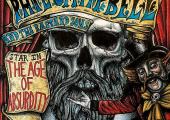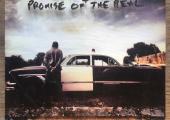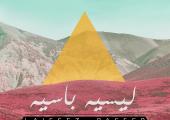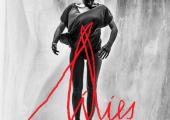CD: Owen Broder - Heritage


Lisa Halliday’s striking debut novel consists of three parts. The first follows the blooming relationship between Alice and Ezra (respectively an Assistant Editor and a Pulitzer Prize-winning writer) in New York; the middle section comprises a series of reflections narrated by Amar, an American-Iraqi while he is held in detention at Heathrow en route to see his brother in Iraqi Kurdistan.

Many hard rock aficionados say that Motörhead’s greatest work was all with the “classic” line-up of Lemmy, drummer Phil “Philthy Animal” Taylor and guitarist “Fast” Eddie Clarke (who died last week aged only 67 - this review was written before that news came through). While there’s no denying their 1976-82 output was storming, Motörhead’s later career contained multitudes of gems that were its match. The band’s guitarist for this period, for 31 years from 1984 until Lemmy’s death, was Phil Campbell. He now releases the debut album by a band he formed with his three sons shortly after his legendary frontman’s passing.
So where was Campbell to go next? Judging from The Age of Absurdity, a return to the classic rock template, but fuelled with Motörhead’s desire for high velocity impact. Campbell is staunchly Welsh, a taciturn individual (I interviewed him once: polite, dryly funny, but making him say anything of consequence was blood-from-stone stuff). He’s also an amazing guitarist, able to inject squiggly blues-lickin’ solos with a furious zest. His sons Todd, Dane and Tyla are up to the task of surrounding him, while Neil Starr, once singer for Welsh rockers Attack! Attack!, is on vocals. They go at it with vim. There’s enough juice to make this more than a post-glory novelty.
They’re at their best on raging rock-punk assaults, somewhere between The Ramones and early Lostprophets, with numbers such as “Skin and Bones”, “Gypsy Kiss” and “Step Into the Fire” roaring out of the speakers. Campbell’s impeccable guitar work provides the centrepiece of some songs – the single “Ringleader” and the tasty harmonica-led blues jam “Dark Days” – while those looking for Motörhead-alike kicks should turn to the rock’n’rollin’ “Dropping the Needle”. Quibbles: too much filler, and sometimes I found myself wishing Starr had a more characterful, less mainstream rock voice (but then sometimes he comes into his own, notably on the epic six-and-a-half minute closer “Into the Dark”).
There’s a straightforward rerun of Hawkwind’s “Silver Machine”, featuring that band’s leader Dave Brock, as a bonus track. It’s OK, but probably more fun live, which is where I suspect this lot come into their own. In the meantime, their debut album is feisty hard rock worth cherry-picking.
Overleaf: Watch the video for "Ringleader" by Phil Campbell and the Bastard Sons

The vocalist Cécile McLorin Salvant first came to the attention of the jazz scene when she won the prestigious Thelonious Monk International Jazz competition in 2010. In 2013, her Mack Avenue Records debut WomanChild garnered a Grammy nomination. Two years later, she picked up her first Grammy Award when her follow-up release For One To Love won Best Jazz Vocal Album.

As well as creating a true American musical phenomenon, led by from the front by Nirvana, the early-to-mid-Nineties grunge explosion opened a window of opportunity for multitudes of bands on its furthest fringes. South Carolina punk-metallers Corrosion of Conformity hit a career peak at the time, mingling an old-school hard rock sound with something bluesier and spacier, the whole thing marinated in the guitar and vocals of Pepper Keenan. He left to concentrate on his role in metal supergroup Down, featuring members of Pantera and others, but now returns for his first album since 2005 with the band that made his name.
The good news is that, after a patchy couple of albums without Keenan, Corrosion of Conformity’s 10th is an atmospheric beast, with an undertow of southern boogie, southern gothic and, as per its title and moody downtempo title track, a certain southern focus on religion. It also contains a decent selection of rolling riff-monsters, notably the slow-starting but epic “Nothing Left to Say”, the sludgy six-minute closer “A Quest to Believe (A Call to the Void)” and the hefty “Old Disaster”.
The showcase guitar work is also a treat. Corrosion of Conformity don’t go in for hyperspeed shredding, and give their fret-wrangling room to breathe. The stoned jam interlude on “Wolf Named Crow”, a song about Keenan’s dog, is especially rich in this vein. Unlike many metal outings, No Cross No Crown paces itself, dropping in occasional short instrumental interludes between tracks, and the band is happily not afraid of a proper tune either, with songs such as “Forgive Me” boasting an unlikely catchiness among the blues-squall assault absorbed on first listening.
To non-metallers, the cover art and nomenclature may be off-putting but Corrosion of Confomity’s latest demonstrates there’s fierce, authentic and enjoyable hard rocking to be had with this band.
Overleaf: Watch the video for "Wolf Named Crow" by Corrosion of Conformity

From newcomer Jazzmeia Horn to the Grammy-winning elder statesman Alan Broadbent, this round-up of favourite jazz releases represents just the tip of a huge iceberg of activity in 2017.
A strong year for UK label Edition Records included Denys Baptiste’s The Late Trane, a beautiful deep dive into late period Coltrane by the outstanding British tenor player, plus the whiplash-inducing gear changes of Phronesis’s The Behemoth, which saw the Scandinavian/British trio’s back catalogue cast in dazzling big band arrangements.
For ECM, US pianist Craig Taborn followed his solo debut Avenging Angel (2011) and trio date Chants (2013) with the expanded quartet palette of Daylight Ghosts, a genuine partnership of equals rather than, as Taborn puts it, “piano adventures with supporting cast”.
The New Zealand-born, US-based pianist, composer and arranger Alan Broadbent delivered one of the most richly atmospheric orchestral jazz scores you’ll have the pleasure of hearing with his three-movement magnum opus, Developing Story. In what was a banner year for Broadbent, his collaboration with vocalist and lyricist Georgia Mancio resulted in the 12 sublime songs of Songbook.
The Dallas-born, NYC-based vocalist Jazzmeia Horn served up one of the singularly most powerful debuts of recent times with A Social Call, few albums combined exultation and sorrow quite so persuasively as Liane Carroll’s The Right To Love, while Jazz FM Vocalist of the Year nominee Polly Gibbons delivered everything from big band swagger to small group swing on her memorable second release on Resonance Records, Is It Me...?
My Album of the Year saw vocalist and songwriter Cécile McLorin Salvant continue her inexorable rise with Dreams and Daggers, a brilliant 2CD set whose fascinating track list juxtaposed standards, vaudeville, blues and more, ranging from the glorious “You’ve Got To Give Me Some” – a song associated with one of McLorin Salvant’s touchstones, Bessie Smith – to a compelling interpretation of “Somehow I Never Could Believe” from the Kurt Weill/Langston Hughes opera Street Scene. We’ll find out later this month if the singer has bagged a second Grammy.
Two More Essential Albums from 2017
Alan Broadbent - Developing Story
Denys Baptiste - The Late Trane
Gig of the Year
Branford Marsalis Quartet with Kurt Elling at the Barbican
Track of the Year
Cécile McLorin Salvant - “Somehow I Never Could Believe”
@MrPeterQuinn
Overleaf: Listen to Cécile Mclorin Salvant perform “Somehow I Never Could Believe”

Until now, the easiest non-bootleg way to hear the early Rolling Stones live was via the various home cinema editions of October 1964’s T.A.M.I. show. Otherwise, although they employed backing tracks for broadcast, the American DVDs of their Ed Sullivan Show appearances caught the band in thrilling full flight.

Not since the 1960s has there been so much global shit to protest about! The Sixties, of course, gave us the protest song – and how well the best of them have worn. “Masters of War” and “With God On Our Side” are timeless classics. “Give Peace a Chance” can still be heard from the barricades.

It’s impossible to discuss TootArd without digging into the history of their region. They’re a funky desert blues outfit but they don’t derive from Saharan Africa; they were born and raised in the village of Majdal Shams in the Golan Heights. This is the region Israel grabbed off Syria in the Six-Day War of 1967, then fully annexed in 1981, claiming it as Israeli territory. However, Arabic Syrians who remained were rendered stateless, given “Laisser-Passer” travel papers by the Israeli government rather than the passports of a full citizen. Hence the album’s title.
The band, currently consisting of Nakhleh brothers Hasan and Rami (vocals/guitar/bass/percussion) and saxophonist Amr Mdah, are now based in Europe. They originally came together as a reggae covers outfit and there’s certainly a rolling dub feel to some of their music, but their first album to receive international release has more in common with the likes of Tinariwen and Tamikrest, as is made clear from the festival-rockin’ explosive opening title track, protesting their statelessness in song.
These musicians are also marinated in Arabic classical and western pop, which adds up to an approachable sound. They’re kind of a jam-band but with the discipline to keep things tight, percussion bubbling to the surface on cuts such as “Sahra” and the droning, propulsive “Bayati Blues”. Wind instrumentation swoops in and out, giving a rich sense of Middle Eastern jazziness. TootArd are equally capable of mellow numbers, stoned-out widescreen affairs that do, indeed, summon up the desert, as on the melancholic closing instrumental “Syrian Blues” or “A’sfur”, which bears a passing resemblance to Hans Zimmer’s iconic music for the film Thelma and Louise.
Because it’s not sung in English the politics of Laisser-Passer are implicit rather than battering at the average listener. However, TootArd’s way with a groove is compulsive and liable to drag listeners bobbing and dancing unforced into their musical world.
Overleaf: Listen to the title track of TootArd's "Laisser Passer"

Mélanie De Biasio is a Belgian jazz singer, an album-charting artist in her home country, and rising star elsewhere. She is not a woman who takes the straightforward path. No album of Nat King Cole covers for her. No Jamie Cullum guest appearances on her third album, Lillies. Instead, she offers up her own moody take on alt-pop which, if she feels like it, as on the smoky slow late night piano title track, might sit within an immediately recognizable jazz idiom, but is equally liable to be something pulsing, electronic and very quietly groove-ridden, as on the single “Gold Junkies”.
De Biasio has said she composed the album by locking herself away, no flash studio, just her, some software and a mic. “I wanted to go back to the seed of creativity, the simplest materials,” is how she put it. Lillies is, consequently, often pared back. “Sitting in the Stairwell”, for instance, acapella, with just finger-click percussion, recalls the ethno-musical folk recordings of Alan Lomax across the southern US states, a blues worthy of Vera Hall, although De Biasio’s voice is gentler and more musically nuanced.
There’s not much you can dance to, unless we’re talking slow ballroom in a dusty bar in a David Lynch film, but occasionally De Biasio sets an electronic pulse tickering along. “Afro American” fits this bill, offering up a midnight electronic head-nodder, with a catchy tune and, tinted with flute, De Biasio’s original instrument. Lillies also has something of post-punk’s aesthetic about it. The closing “An My Heart Goes On”, wherein De Biasio whispers against a scratchy backdrop, is stark, sonically bleak, a bit New York no wave, but eventually builds via a rising bassline into something more red-blooded.
Mélanie De Biasio's latest work does not put her in easily definable territory, occupying jazz’s shadowed underbelly, but its gloominess is never morose, and what eventually shines through is warm and very human.
Overleaf: Watch the video for Mélanie De Biasio's "Your Freedom is the End of Me"